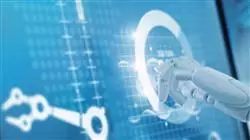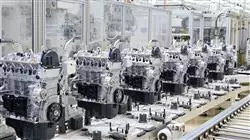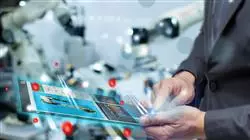University certificate
The world's largest faculty of information technology”
Why study at TECH?
This program will allow you to detect the main keys in the digitization process of manufacturing in a first level company"

The Industrial Internet of Things is the network of sensors, digital applications and autonomous devices that enables the exchange of information between the technologies themselves through the use of the Internet. In this line, its use is highly beneficial for companies, since it allows them to obtain rigorous data to establish their analysis and optimize business production, in this way reducing the costs of manufacturing goods or providing certain services. For this reason, computer scientists specialized in working with this technology are increasingly in demand by leading international companies.
Faced with this situation, TECH has promoted the creation of this program, which will enable the student to delve into the intricacies of the Industrial Internet of Things, in order to boost its growth in a booming sector. During 6 months of intensive learning, you will delve into the protocols for implementing Lean Manufacturing in industrial processes or evaluate the main features and phases of manufacturing digitalization. In addition, the student will analyze the architectural keys behind a Smart Factory.
Because this program is developed through a completely online methodology, the students will develop their own schedules to access a first-class program. Likewise, this Postgraduate diploma is designed and taught by leading specialists in the area of IIoT and technological solutions for companies, so the knowledge that the computer scientist will assimilate will preserve a full professional applicability.
The Postgraduate diploma in Industrial Internet of Things (IIoT) will enable you to identify opportunities for implementing Lean Manufacturing in industrial processes"
This Postgraduate diploma in Industrial Internet of Things (IIoT) contains the most complete and up-to-date program on the market. The most important features include:
- The development of case studies presented by experts in technological solutions
- The graphic, schematic, and practical contents with which they are created, provide practical information on the disciplines that are essential for professional practice
- Practical exercises where self-assessment can be used to improve learning
- Its special emphasis on innovative methodologies
- Theoretical lessons, questions to the expert, debate forums on controversial topics, and individual reflection assignments
- Content that is accessible from any fixed or portable device with an Internet connection
Enjoy a pleasant and effective learning experience through the teaching formats offered by this program, such as the explanatory video or the interactive summary"
The program’s teaching staff includes professionals from the sector who contribute their work experience to this training program, as well as renowned specialists from leading societies and prestigious universities.
The multimedia content, developed with the latest educational technology, will provide the professional with situated and contextual learning, i.e., a simulated environment that will provide immersive education programmed to learn in real situations.
This program is designed around Problem-Based Learning, whereby the professional must try to solve the different professional practice situations that arise during the educational year. For this purpose, the students will be assisted by an innovative interactive video system created by renowned and experienced experts.
The characteristic Relearning system of this Postgraduate diploma will allow you to learn at your own pace without depending on external teaching conditions"

Throughout this educational period, you will handle the protocols required to implement IIoT in different branches of business activity"
Syllabus
The plan of study of this program is made up of 3 modules through which the computer scientist will significantly increase his knowledge of the Industrial Internet of Things. All the teaching resources you will have at your disposal throughout this program are available in a wide range of textual and multimedia formats. With this, and with its 100% online methodology, TECH's objective is to provide the student with a 24-hour learning process that can be carried out 24 hours a day.

The 100% online methodology of this program will enable you to learn the keys to IIoT without having to leave your home"
Module 1. 4.0 Industry
1.1. Definition of 4.0 Industry
1.1.1. Features
1.2. Benefits of the 4.0 Industry
1.2.1. Key Factors
1.2.2. Main Advantages
1.3. Industrial Revolutions and Vision of the Future
1.3.1. Industrial Revolutions
1.3.2. Keys Factors in Each Revolution
1.3.3. Technological Principles as a Basis for Possible New Revolutions
1.4. The Digital Transformation of the Industry
1.4.1. Characteristics of the Digitization of the Industry
1.4.2. Disruptive Technologies
1.4.3. Applications in the Industry
1.5. Forth Industrial Revolution Key Principles of Industry 4.0
1.5.1. Definitions
1.5.2. Key Principles and Applications
1.6. 4.0 Industry and Industrial Internet
1.6.1. Origin of IoT
1.6.2. Operation
1.6.3. Steps to Follow for its Implementation
1.6.4. Benefits
1.7. Smart Factory Principles
1.7.1. Smart Factory
1.7.2. Elements That Defiine a Smart Factory
1.7.3. Steps to Deploy a Smart Factory
1.8. Status of the 4.0 Industry
1.8.1. Status of the 4.0 Industry in Different Sectors
1.8.2. Barriers to the Implementation of 4.0 Industry
1.9. Challenges and Risks
1.9.1. DAFO Analysis
1.9.2. Challenges
1.10. Role of Technological Capabilities and the Human Factor
1.10.1. Disruptive Technologies in Industry 4.0
1.10.2. The Importance of the Human Factor Key Factor
Module 2. Industry 4.0 Automation Systems
2.1. Industrial Automation
2.1.1. Automization
2.1.2. Architecture and Components
2.1.3. Safety
2.2. Industrial Robotics
2.2.1. Fundamentals of Industrial Robotics
2.2.2. Models and Impact on Industrial Processes
2.3. PLC Systems and Industrial Control
2.3.1. PLC Evolution and Status
2.3.2. Evolution of Programming Languages
2.3.3. Computer Integrated Automation CIM
2.4. Sensors and Actuators
2.4.1. Classification of Transducers
2.4.2. Types of Sensors
2.4.3. Standardization of Signals
2.5. Monitor and Manage
2.5.1. Types of Actuators
2.5.2. Feedback Control Systems
2.6. Industrial Connectivity
2.6.1. Standardized Fieldbuses
2.6.2. Connectivity
2.7. Proactive/Predictive Maintenance
2.7.1. Predictive Maintenance
2.7.2. Fault Identification and Analysis
2.7.3. Proactive Actions Based on Predictive Maintenance
2.8. Continuous Monitoring and Prescriptive Maintenance
2.8.1. Prescriptive Maintenance Concept in Industrial Environments
2.8.2. Selection and Exploitation of Data for Self-Diagnostics
2.9. Lean Manufacturing
2.9.1. Lean Manufacturing
2.9.2. Benefits Lean Implementation in Industrial Processes
2.10. Industrialized Processes in Industry 4.0. Use Case
2.10.1. Project definition
2.10.2. Technological Selection
2.10.3. Connectivity
2.10.4. Data Exploitation
Module 3. Internet of Things (IoT)
3.1. Cyber-Physical Systems (CPS) in the Industry 4.0 Vision
3.1.1. Internet of Things (IoT)
3.1.2. Components Involved in IoT
3.1.3. Cases and Applications of IoT
3.2. Internet of Things and Cyber-Physical Systems
3.2.1. Computing and Communication Capabilities to Physical Objects
3.2.2. Sensors, Data and Elements in Cyber-Physical Systems
3.3. Device Ecosystem
3.3.1. Typologies, Examples and Uses
3.3.2. Applications of the Different Devices
3.4. IoT Platforms and their Architecture
3.4.1. IoT Market Typologies and Platforms
3.4.2. Operation of an IoT Platform
3.5. Digital Twins
3.5.1. Digital Twins
3.5.2. Uses and Applications the Digital Twin
3.6. Indoor & outdoor Geolocation (Real Time Geospatial)
3.6.1. Indoor and Outdoor Geolocation Platforms
3.6.2. Implications and Challenges of Geolocation in an IoT Project
3.7. Security Intelligence Systems
3.7.1. Typologies and Platforms for Security Systems Implementation
3.7.2. Components and Architectures in Intelligent Safety Systems
3.8. IoT and IIoT Platform Security
3.8.1. Security Components in an IoT System
3.8.2. IoT Security Implementation Strategies
3.9. Wearables at Work
3.9.1. Types of Wearables in Industrial Environments
3.9.2. Lessons Learned and Challenges in Implementing Wearables in the Workplace
3.10. Implementing an API to Interact with a Platform
3.10.1. Types of APIs Involved in an IoT Platform
3.10.2. API Market
3.10.3. Strategies and Systems to Implement API Integrations

Obtain learning based on your educational needs, optimizing your teaching by means of teaching formats present in different multimedia and textual supports"
Postgraduate Diploma in Industrial Internet of Things (IIoT)
Would you like to become an expert in Industrial Internet of Things (IIoT)? TECH Global University offers you the opportunity to acquire the necessary skills to excel in this field through its Postgraduate Diploma, taught in online mode by the prestigious Faculty of Computer Science. By embarking on this program, you will immerse yourself in a world of deep and specialized knowledge. Our faculty, internationally recognized for its academic excellence, has a team of highly qualified teachers who will guide you through every step of your learning. What awaits you in the program? You will discover how the convergence of technology and industry is transforming manufacturing processes, automation and business decision making. At the conclusion of the program, you will have developed key IIoT skills, such as sensor and device implementation, real-time data management, industrial cybersecurity, and industrial process optimization. In addition, you will have a deep understanding of how IIoT is revolutionizing efficiency and competitiveness in various industries.
Acquire expertise in Industrial Internet of Things (IIoT).
The specialization you will receive will give you a competitive edge in today's job market. The goal is to prepare you to take on leadership roles in the industry, where you will be able to apply your knowledge to improve productivity and quality in companies of all types. Upon completion, you will receive a certificate, backed by the reputation of our university. This certificate will open doors to exciting career opportunities, from automation engineering to consulting. At TECH, we believe that the future belongs to those who stay on the cutting edge of technology. Are you ready to step into a career full of possibilities? Join the Postgraduate Diploma in Industrial Internet of Things (IIoT) and begin your journey to excellence!







